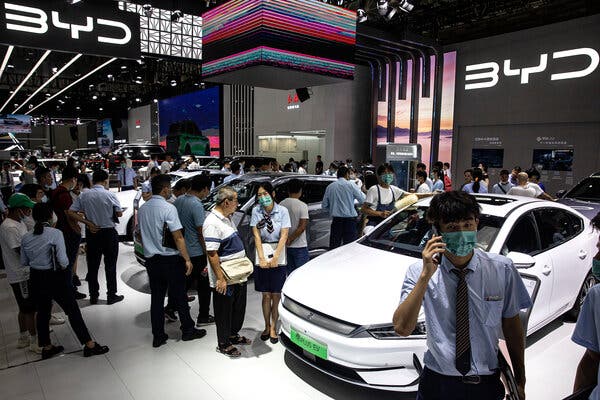China-Made Vehicles: The Future Of The Automotive Industry?

Table of Contents
The Rise of Chinese Automakers
The success story of China-made vehicles is largely due to the impressive growth and global expansion of its domestic automakers. No longer just producing budget-friendly options, these brands are increasingly competing on features, technology, and even brand prestige. Companies like Great Wall Motors, BYD Auto, NIO, Xpeng, and Geely are leading this charge, aggressively pursuing market share both domestically and internationally.
- Top Chinese Automakers and Key Models: BYD (Han, Tang, Atto 3), NIO (ET7, ES8, EC6), Xpeng (G9, P7, P5), Geely (Lynk & Co, Volvo models), Great Wall Motors (Haval, ORA).
- Global Expansion Successes: Many Chinese automakers have successfully penetrated Southeast Asian markets, with some making significant inroads in Europe and even North America, often leveraging competitive pricing and appealing features.
- Strategic Partnerships and Acquisitions: Several Chinese automakers have strategically acquired or partnered with international companies, gaining access to technology, distribution networks, and established brand recognition. This further strengthens their position in the global automotive landscape.
Technological Innovation and Electric Vehicles (EVs)
China is a global leader in electric vehicle (EV) technology, driving innovation across the board. This is evident not only in the number of EVs produced but also in the advancements in battery technology, autonomous driving features, and overall vehicle design. Chinese EV manufacturers are particularly competitive, offering a compelling combination of advanced technology and attractive pricing.
- Battery Technology Advancements: Chinese companies are at the forefront of developing more efficient and cost-effective battery technologies, including advancements in battery chemistry and charging infrastructure. This is crucial for widespread EV adoption.
- Autonomous Driving Capabilities: Many Chinese automakers are incorporating sophisticated autonomous driving features into their electric vehicles, pushing the boundaries of what’s possible in driver-assistance technology.
- Pricing and Performance Comparison: Chinese EVs often offer competitive performance at lower price points compared to established international brands, making them attractive to budget-conscious consumers.
Cost-Effectiveness and Competitive Pricing
A key factor contributing to the success of China-made vehicles is their cost-effectiveness and competitive pricing. This is largely due to several factors.
- Lower Labor Costs and Government Subsidies: Lower labor costs in China, coupled with government subsidies aimed at boosting the automotive industry, significantly reduce the overall cost of production.
- Economies of Scale: The massive scale of production in China allows for economies of scale, further reducing manufacturing costs and enabling competitive pricing in the global market.
- Price Comparison with International Models: Comparing similarly equipped models, China-made vehicles frequently offer lower sticker prices, making them highly attractive to price-sensitive buyers worldwide.
Challenges and Concerns
Despite the significant advancements, China-made vehicles face challenges in achieving complete global dominance.
- Brand Perception and Consumer Trust: Overcoming perceptions of lower quality and building strong brand recognition in international markets remains a crucial challenge.
- International Regulations and Standards: Meeting stringent international safety and emission standards, and navigating diverse regulatory landscapes, requires considerable effort and investment.
- Supply Chain Issues and Export Restrictions: Potential disruptions to global supply chains and potential export restrictions can impact production and market access.
Conclusion
The rise of China-made vehicles is undeniable. Their technological innovation, particularly in the EV sector, coupled with competitive pricing, presents a strong challenge to established automakers. While challenges related to brand perception, regulatory hurdles, and supply chain vulnerabilities persist, the potential for continued growth and influence in the global automotive market is significant. The question of whether China-made vehicles will define the future of the industry remains open, but their impact is already substantial and continues to evolve rapidly. Learn more about the exciting developments in the world of China-made vehicles and explore how these innovations are transforming the global automotive landscape. Stay informed about the latest news and advancements in the rapidly evolving market of Chinese cars and electric vehicles.

Featured Posts
-
 Cassidy Hutchinsons Account Of The January 6th Hearings A Forthcoming Memoir
Apr 26, 2025
Cassidy Hutchinsons Account Of The January 6th Hearings A Forthcoming Memoir
Apr 26, 2025 -
 A Timeline Of Karen Reads Murder Cases
Apr 26, 2025
A Timeline Of Karen Reads Murder Cases
Apr 26, 2025 -
 The Worlds Tallest Abandoned Skyscraper A Construction Update
Apr 26, 2025
The Worlds Tallest Abandoned Skyscraper A Construction Update
Apr 26, 2025 -
 The China Market Challenges And Opportunities For Premium Auto Brands Like Bmw And Porsche
Apr 26, 2025
The China Market Challenges And Opportunities For Premium Auto Brands Like Bmw And Porsche
Apr 26, 2025 -
 The Transatlantic Ai Divide Trump Administrations Stance On European Regulations
Apr 26, 2025
The Transatlantic Ai Divide Trump Administrations Stance On European Regulations
Apr 26, 2025
